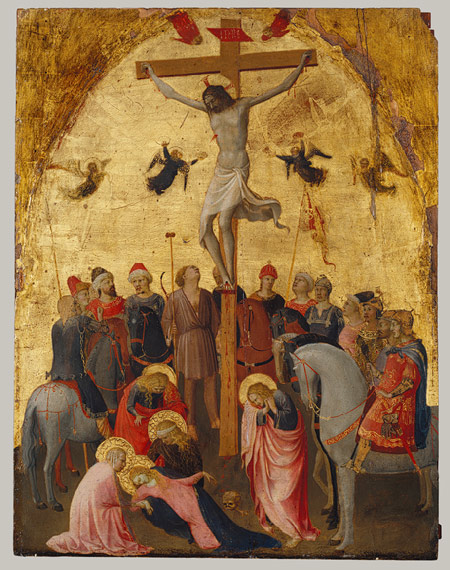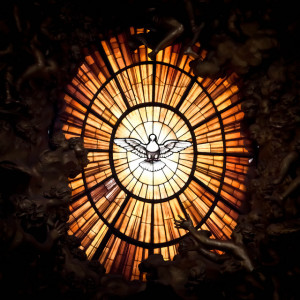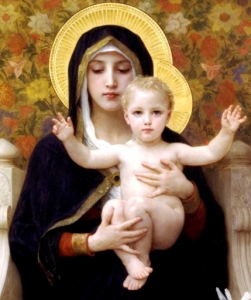I have of late been making decent progress at praying a daily Rosary. It can be tough at first, and I know there are probably times when it seems like a waste of effort, but I have found that my best days are when I pray the Rosary well, and my worst days are when I allow myself to skip the Rosary. Recently I was struck by the fact that every mystery of the Rosary is, in fact, a facet of the Yes God says to and about us and that He hopes we will return to Him. As Pope Emeritus Benedict XVI once said, Catholicism is a religion of “yes”; behind all the “nos” we hear so much about there is an even more vibrant and life-giving “yes”. This is equally true in one of her most well-known prayers. As today is Monday, I’d like to look at the Joyful Mysteries.
The Annunciation
I don’t think it’s at all hard to see at least one “yes” in this scene. Mary, confronted by an angel, is asked to be the Mother of God. Given assurance by the Angel she utters words that have rung down through the centuries: “fiat mihi secundum verbum tuum” – “be it done unto me according to your word”. (Lk 1:38) Asked to surrender every chance she has ever had at a “normal” life, Mary utters the “yes” that becomes the hinge upon which the fate of humanity begins to turn. Theologians have debated just how much she understood about what she was being asked to do and what it meant for her life but ultimately no matter on which side of that argument you fall you have to realize that she knew she was faced with changes so significant she couldn’t fully comprehend them at that time. This wasn’t simply a “yes” to a fully detailed plan with flow charts, graphics, and a timeline approved by a committee – this was a “yes” to step into an unknown, a “yes” of trust in the Lord. Whenever it seems like just too many things are unknown for us to follow God’s call, perhaps we can look to this fiat for inspiration. Yes, Lord, I trust in Your word.
The Visitation
With what seems, according to Luke’s telling of the story, almost no delay at all Mary next goes off to help her cousin Elizabeth. She who has just had the most remarkable conversation with an angel of God now leaves to take care of another. But notice that she doesn’t just leave leisurely – she “went with haste” (Lk 1:39) on her trip. She didn’t waste time, she didn’t send word that something had happened and she needed to “find herself” – she left at once and made haste to be of service to someone who needed her. The next time someone needs our help, maybe we can not worry quite so much about covering all our bases and simply make haste to help them, knowing that God will provide, that He is the ultimate Servant of the Servants of God. Yes, Lord, I will serve You in those who need my help.
The Nativity
Depending upon how you look at it, this must be either the number one or number two greatest example of the “yes” of God towards the human race. Not only did He create us. Not only did He show mercy when man turned away from Him over and over again. Not only did He reveal himself to a world that had obscured its vision of Him through sin. Not only did He in the fullness of time come to save us all. He did all those things – but not merely by the force of His Divine Will – He added a triumphant “yes” to the goodness of humanity by becoming one of us. A proverbial stroke of the pen was not sufficient to show how much He values humanity – He did not want to just “make it so”, he wanted to live it with us. If you’re having one of those days where it just seems that absolutely nothing will ever go right, contemplate the immeasurable “yes” in this Mystery. God not only wanted us to exist, He not only wanted us to be redeemed, He not only wanted to open the gates of Heaven to us, He wanted to participate in our very lives to the fullest extent possible, to an extent that even now can be hard to fully fathom. But yet He did it all the same, without question, without remorse, and even if there were but one single soul to save He would do it the exact same way. Yes, Lord, I know you will do anything for my good.
The Presentation In The Temple
Imagine the scene if you can. Mary and Joseph are following the dictates of the Law of Moses and presenting the first born male to the Lord. Upon entering the temple they are greeted by a man who has absolutely amazing words for them. Even though they have been told by angels of their son’s divine origins and destiny, imagine being greeted by these words: “Behold, this child is set for the fall and rising of many in Israel, and for a sign that is spoken against (and a sword will pierce through your own soul also), that thoughts out of many hearts may be revealed.” (Lk 2:34-35) This child, the Son of God, will be a sign that is spoken against. Mary will experience her soul being pierced by a sword. This are incredibly hard words, and yet said by a man in quite evident joy. Mary and Joseph must have been at least a little perplexed that this Son of theirs would experience such harsh treatment at the hands of a humanity that ought to love Him, that Mary who simply offered herself in service to God might have to share somehow in that suffering. But this did not deter them, did not cause them to run away from the lives laid out for them into the safety of obscurity. They simply did what they knew to be right, trusting that God would show them not only the path but the way through the path even if only one step at a time. Yes, Lord, despite dangers, concerns, or even threats I will walk with you knowing that You always hold me in the palm of Your hand.
The Finding Of The Child Jesus In The Temple
Now as if Mary and Joseph haven’t had enough to handle already, one day they discover on their way back from Jerusalem that Jesus is missing. The child given them by God, spoken of by angels, they have now lost. As a parent I get a pang in my stomach just contemplating that thought. They search agonizingly in Jerusalem for their boy, knowing how dangerous it could be and yet also trusting that God will take care of the situation. Suddenly they find him in the temple, calmly conversing with the scribes. When they confront him, he calmly replies, “How is it that you sought me? Did you not know that I must be in my Father’s house?” (Lk 2:49) Perhaps that prick of the conscience in the question is targeted at us even more than it was to Mary and Joseph. Have we, in all our frenzied planning and working, forgotten where to find Jesus? Despite its goodness, Jesus is not found in a well-organized action plan. He is found in His Father’s house; He is found in the Church, in Her liturgies, in Her teachings, in the Body of Christ. When we have failed to find Jesus outside, let us come in the Church and find Him where he awaits us always, in the Blessed Sacrament. Yes, Lord, I will ever seek Your Heart in the heart of Your Church.








